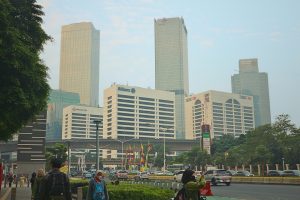Indonesia has officially applied to join the Comprehensive and Progressive Agreement for Trans-Pacific Partnership (CPTPP) in a bid to increase its exports, a senior minister said yesterday.
Airlangga Hartarto, the coordinating minister for economic affairs, said that his ministry had handed over its official letter of application to New Zealand, which, as the “depositary” of the CPTPP, is responsible “for various tasks including receiving and circulating specified notifications and requests made under the Agreement.”
Indonesia’s membership bid was “aimed at driving structural reform in the country and opening markets for Indonesia’s economy,” he said in a press conference in Jakarta yesterday, according to the state news agency Antara. “Imports and exports will increase and eventually will increase trade between CPTPP member countries,” he added.
Airlangga said that President Joko “Jokowi” Widodo had pushed for Indonesia to join the 11-member pact, but that the decision was also supported by President-elect Prabowo Subianto, who will be sworn into office next month.
The CPTPP started life as the Trans-Pacific Partnership, which was spearheaded by the United States under President Barack Obama before his successor Donald Trump pulled the U.S. out of the agreement in 2017. The pact currently comprises 12 countries: Australia, Brunei, Canada, Chile, Japan, Malaysia, Mexico, New Zealand, Peru, Singapore, the United Kingdom, and Vietnam.
In addition to Indonesia, seven countries, including China and Costa Rica, have expressed interest in becoming CPTPP members. The United Kingdom is the first nation to join the pact since the American withdrawal; it is set to accede to the treaty once it is ratified by its parliament and each member nation, something that is expected to happen by December of this year.
Jakarta announced its intention to join the pact in May, hoping to attract investment by widening export market access.
Boasting a young and growing population that has a pressing need for economic opportunity, Indonesia under Jokowi has actively courted foreign investment. His administration has set a goal of becoming an advanced economy by 2045, when it will mark the centennial of its independence – a project that the Jokowi administration has termed “Indonesia Emas,” or Golden Indonesia.
To support its domestic economic goals, it has prioritized joining multilateral trade pacts. In November 2022, it ratified the Regional Comprehensive Economic Partnership (RCEP) agreement, which includes all 10 ASEAN member states, Australia, New Zealand, China, Japan, and South Korea. The agreement then entered into force in January 2023.
In February of this year, the Organization for Economic Cooperation and Development (OECD) announced that it would also open accession talks with Indonesia, after receiving the approval of the group’s 38 members. While the OECD membership criteria are strict, and run against the grain of the protectionist policies that have marked Jokowi’s decade in office, if admitted, Indonesia would become the first nation from Southeast Asia to join what is often referred to as a “rich country club.”
Requesting entry into the CPTPP reflects Jakarta’s intention to leave no stone unturned in its pursuit of augmented trade and investment that can help develop the economy and support the current dominant political dispensation. While the CPTPP’s membership criteria are arguably less stringent than those of the OECD, they are also likely conflict with certain elements of Indonesian economic policy, particularly Jakarta’s willingness to use the power of the state to protect local industries and maintain political and economic stability. This includes its complex register of energy subsidies and its industrial policy around nickel mining and processing.
If admitted, however, membership would undoubtedly strengthen Indonesia’s position on the global stage as the first Association of Southeast Asian Nations (ASEAN) country in the G-20 to become a member of the CPTPP. In Southeast Asia, Thailand and the Philippines have also expressed an interest in joining the pact. Together, these current and prospective members include seven of the 10 members of ASEAN, including six of its largest economies.

































